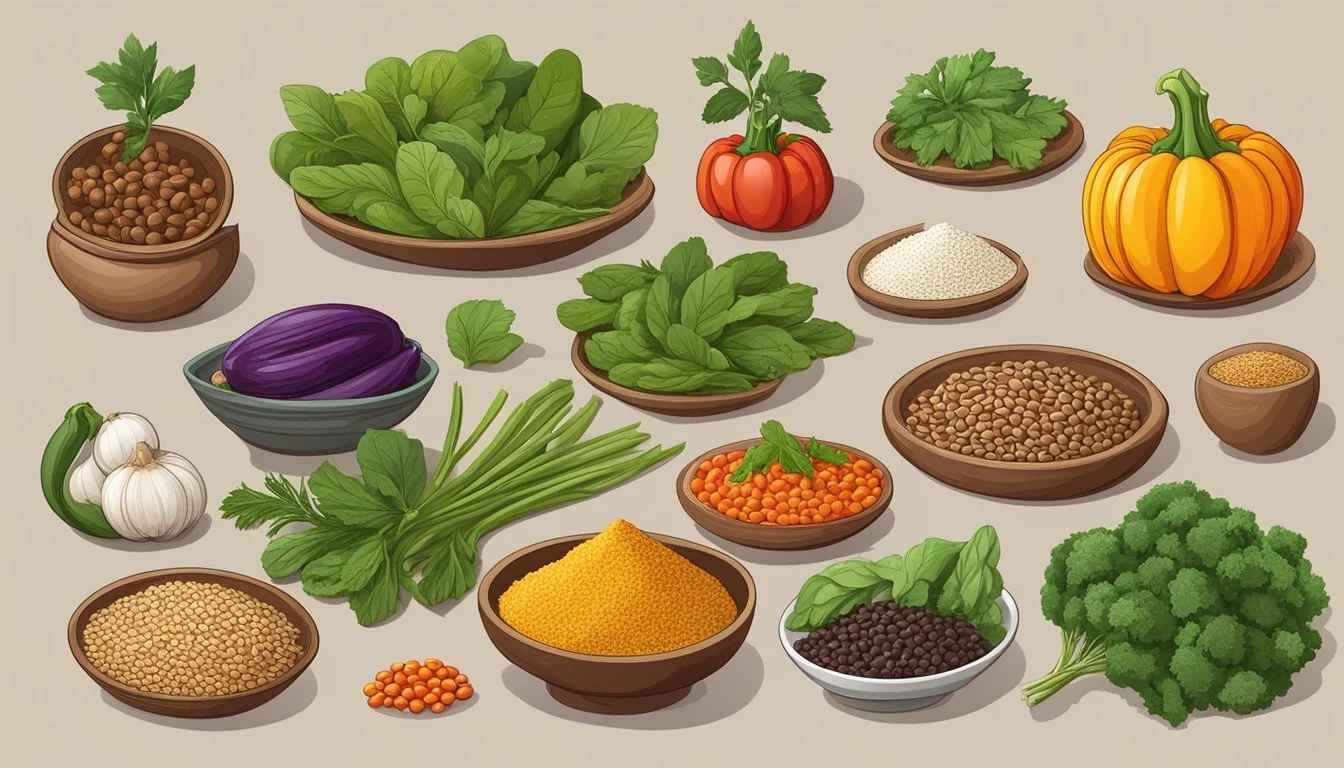Flavorful Vegetarian Dinner Recipes for Diabetes Management
Managing diabetes doesn't mean giving up flavorful meals. Vegetarian dinners can be delicious, satisfying, and beneficial for blood sugar control. Plant-based recipes rich in fiber, complex carbohydrates, and healthy fats can help stabilize glucose levels while providing essential nutrients.
A well-planned vegetarian diet offers numerous options for people with diabetes. From hearty lentil soups to colorful stir-fries, these meals can be both nutritious and appealing. Ingredients like quinoa, tofu, and a variety of vegetables form the foundation of balanced, diabetes-friendly dinners.
Crafting vegetarian meals for diabetes management involves focusing on portion control and choosing low-glycemic foods. Dishes that combine protein sources like beans or nuts with non-starchy vegetables and whole grains can create satisfying meals that support overall health and blood sugar regulation.
Understanding Diabetes and the Vegetarian Diet
A vegetarian diet can be beneficial for managing diabetes when properly planned. It emphasizes nutrient-dense foods that can help control blood sugar levels and maintain a healthy body weight.
The Impact of Vegetarian Diets on Blood Sugar Levels
Vegetarian diets often contain more fiber and fewer saturated fats, which can positively affect blood sugar control. High-fiber foods like whole grains, legumes, and vegetables slow down digestion and help stabilize blood glucose levels.
Plant-based proteins, such as those found in beans and lentils, can improve insulin sensitivity. This is crucial for individuals with type 2 diabetes, as it allows cells to use glucose more effectively.
Studies have shown that vegetarian diets may reduce the risk of developing diabetes and improve blood sugar management in those already diagnosed. A registered dietitian can help create a personalized meal plan that balances carbohydrates throughout the day.
Key Nutrients in a Vegetarian Diet for Diabetes
Protein is essential for blood sugar regulation and can be obtained from plant sources like tofu, tempeh, and legumes. These foods provide steady energy without causing blood sugar spikes.
Healthy fats from nuts, seeds, and avocados are important for hormone balance and nutrient absorption. They also help slow down carbohydrate digestion, contributing to better blood sugar control.
Vitamin B12, iron, and calcium require special attention in vegetarian diets. Fortified plant milks, nutritional yeast, and leafy greens can help meet these needs. A well-planned vegetarian diet can provide all necessary nutrients for effective diabetes management.
Carbohydrate counting is crucial for blood sugar management. Focusing on complex carbohydrates from whole grains and vegetables can help maintain stable blood glucose levels throughout the day.
Planning Your Vegetarian Dinner
Creating a balanced vegetarian dinner for diabetes management involves careful consideration of nutrients and portion sizes. A well-planned meal can help stabilize blood sugar levels while providing essential vitamins and minerals.
Balancing Macronutrients and Carbohydrates
A diabetes-friendly vegetarian dinner should contain a mix of carbohydrates, protein, and healthy fats. Aim for 45-60 grams of carbs per meal, depending on individual needs and glucose targets.
Choose complex carbohydrates like quinoa, brown rice, or sweet potatoes. These foods have a lower glycemic index and provide sustained energy.
Incorporate plant-based proteins such as tofu, tempeh, or legumes. These options help maintain muscle mass and promote satiety.
Include healthy fats from sources like avocado, nuts, or olive oil. Fats slow digestion and help prevent blood sugar spikes.
Use measuring tools or the plate method to control portion sizes. Fill half the plate with non-starchy vegetables, a quarter with protein, and a quarter with complex carbs.
Incorporating High-Fiber Foods
Fiber is crucial for blood sugar management and digestive health. Aim for at least 8 grams of fiber per meal.
Focus on whole grains like bulgur, barley, or oats. These provide both fiber and essential nutrients.
Add a variety of colorful vegetables to your plate. Broccoli, spinach, and bell peppers are excellent choices high in fiber and low in carbs.
Include beans and lentils in your meals. They offer a combination of fiber, protein, and complex carbohydrates.
Sneak extra fiber into dishes by adding chia seeds, ground flaxseed, or psyllium husk to salads or smoothies.
Remember to increase fiber intake gradually and drink plenty of water to avoid digestive discomfort.
Healthy and Delicious Vegetarian Dinner Recipes
Vegetarian dinners can be both nutritious and satisfying for people with diabetes. These recipes focus on plant-based proteins and low-carbohydrate options to help manage blood sugar levels.
Protein-Rich Vegetarian Dinners
Tofu, beans, lentils, and nuts are excellent sources of protein for vegetarians. A roasted chickpea curry bowl combines fiber-rich chickpeas with aromatic spices and vegetables for a filling meal.
Buttermilk fried tofu with smoky collard greens offers a plant-based twist on classic comfort food. The tofu provides protein while the collard greens add essential vitamins and minerals.
Lentil and vegetable stir-fry is a quick and easy option. It pairs well with brown rice or quinoa for a complete protein source. Adding edamame boosts the protein content further.
Tempeh can be marinated and grilled for a hearty main dish. Serve it with a side of roasted vegetables like cauliflower or zucchini for a balanced meal.
Low-Carbohydrate Vegetarian Options
Cauliflower rice serves as an excellent base for low-carb vegetarian meals. Top it with grilled tofu, avocado slices, and a variety of colorful vegetables for a nutrient-dense dinner.
Zucchini noodles with homemade pesto and cherry tomatoes create a light yet satisfying meal. Add some nuts or seeds for extra protein and healthy fats.
Stuffed bell peppers filled with a mixture of quinoa, black beans, and vegetables offer a low-carb option that's high in fiber and protein.
A spinach and mushroom frittata made with eggs and cheese provides a protein-rich dinner that's low in carbohydrates. Pair it with a side salad of leafy greens for added nutrients.
Essential Ingredients for a Vegetarian Diabetic Kitchen
A well-stocked vegetarian kitchen for diabetes management focuses on nutrient-dense, low-glycemic foods. Key ingredients include whole grains, legumes, healthy fats, and plant-based proteins.
Choosing Whole Grains and Legumes
Whole grains and legumes are essential for managing blood sugar levels. Brown rice, quinoa, and oats provide complex carbohydrates and fiber. These grains release energy slowly, helping to maintain stable glucose levels.
Legumes like black beans, lentils, and chickpeas are excellent sources of protein and fiber. They have a low glycemic index, making them ideal for diabetic meal plans.
Incorporate a variety of colorful vegetables into your kitchen. Leafy greens, broccoli, and bell peppers are packed with vitamins and minerals. These low-carb options add volume and nutrients to meals without spiking blood sugar.
Fruits, especially berries, offer antioxidants and fiber. Choose whole fruits over juices to retain fiber content and slow sugar absorption.
Stocking Up on Healthy Fats and Proteins
Healthy fats are crucial for a balanced diabetic diet. Avocados, nuts, and seeds provide monounsaturated fats that help improve insulin sensitivity.
Olive oil and canola oil are heart-healthy options for cooking and dressings. These oils contain beneficial omega-3 fatty acids.
Plant-based proteins like tofu, tempeh, and seitan are versatile alternatives to animal products. They offer complete proteins without saturated fat.
Nut butters, such as almond or peanut butter, provide protein and healthy fats. Choose unsweetened varieties to avoid added sugars.
Greek yogurt and cottage cheese are good sources of protein and calcium for lacto-vegetarians. These foods have a minimal impact on blood sugar levels.
Managing Portions and Blood Sugar
Portion control and strategic meal planning are crucial for effective diabetes management. Balancing carbohydrates, proteins, and fats helps regulate blood sugar levels and supports weight management.
Understanding the Role of Portion Sizes
Portion sizes directly impact blood glucose levels. A registered dietitian can help create personalized meal plans tailored to individual needs. Measuring servings and using smaller plates can prevent overeating.
Carbohydrate counting is essential for diabetes management. Aim for consistent carb intake across meals to maintain steady blood sugar. Focus on complex carbs from whole grains, legumes, and vegetables.
Protein and healthy fats help slow digestion and stabilize blood sugar. Include lean plant-based proteins like tofu, tempeh, and legumes in meals. Incorporate moderate amounts of nuts, seeds, and avocado for healthy fats.
Snacks and Sides to Maintain Blood Sugar Levels
Strategically timed snacks can help prevent blood sugar fluctuations between meals. Choose nutrient-dense options that combine carbs with protein or fat.
Vegetable-based snacks are excellent choices. Try celery with almond butter, cucumber slices with hummus, or cherry tomatoes with low-fat cottage cheese. These provide fiber, vitamins, and minerals with minimal impact on blood sugar.
Greek yogurt topped with berries offers protein and probiotics. A small handful of nuts provides healthy fats and protein. Roasted chickpeas or edamame make satisfying, protein-rich snacks.
For sides, focus on non-starchy vegetables like artichoke, lettuce, spinach, and broccoli. These add volume and nutrients without significantly raising blood sugar levels.
Long-Term Benefits and Considerations
Adopting a vegetarian diet for diabetes management can yield significant long-term health benefits. Regular consumption of plant-based meals may lead to improved blood sugar control and reduced risk of cardiovascular complications.
Vegetarian diets rich in whole grains, legumes, fruits, and vegetables provide ample fiber. This can help regulate blood sugar levels and promote better weight management, both crucial for diabetes care.
Plant-based eating patterns often result in lower cholesterol levels and decreased blood pressure. These factors contribute to a reduced risk of heart disease, a common concern for individuals with diabetes.
Focusing on whole, unprocessed foods naturally limits intake of saturated fats and added sugars. This approach supports better overall nutrition and can aid in maintaining healthy blood lipid profiles.
Including healthy fats from sources like nuts, seeds, and avocados can further enhance the nutritional value of vegetarian meals. These foods provide essential fatty acids and help with nutrient absorption.
While a vegan diet can offer similar benefits, careful planning is necessary to ensure adequate protein, vitamin B12, iron, and calcium intake. Consulting with a registered dietitian can help create a balanced meal plan.
It's important to be mindful of processed vegetarian foods, which may contain hidden sugars or unhealthy additives. Prioritizing whole food ingredients ensures the most nutritional benefit from a vegetarian diabetes diet.






